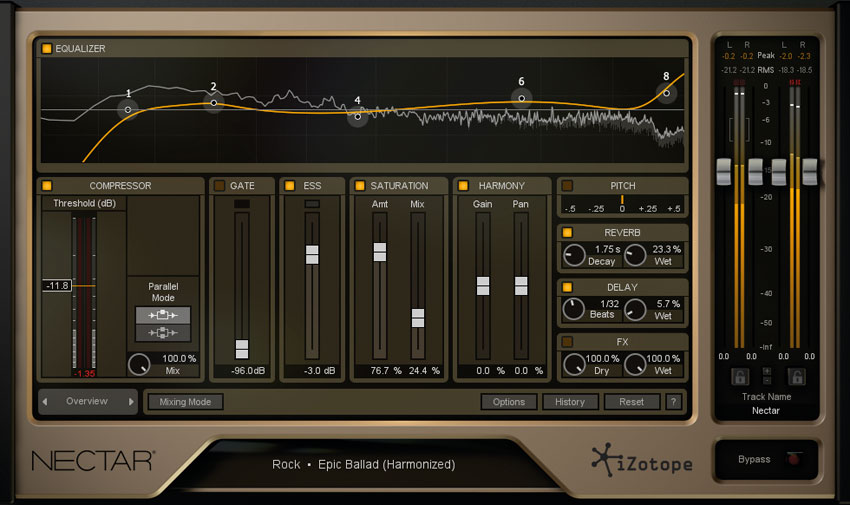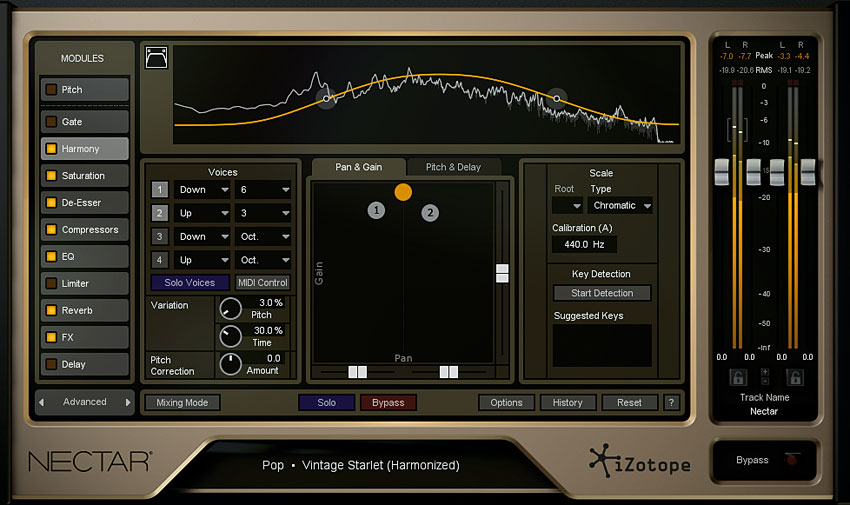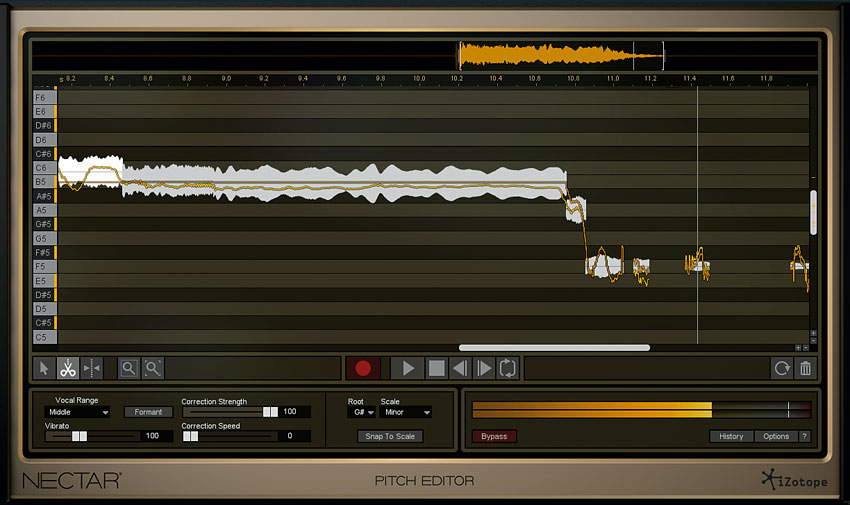MusicRadar Verdict
Another must-have plugin from iZotope, Nectar 2 gives you everything you could need for vocal processing and then some.
Pros
- +
Lots of effects. A true one-stop vocal processing shop. Dedicated manual pitch editor. New Harmony module is awesome. Suitable for beginners and pros alike.
Cons
- -
Breath control doesn't always work convincingly.
MusicRadar's got your back

iZotope Nectar 2

Harmony

Pitch Editor
iZotope really impressed us with the original Nectar back in 2011. Borrowing its fundamental design from a traditional vocal channel strip, Nectar took the concept much further by incorporating many more processes than you'd expect from such a simple setup, including advanced Melodyne/Auto-Tune-esque pitch editing. The result was a convenient, high quality multieffects solution built specifically for vocals. Nice!
"In a nutshell, it's a processing Swiss Army knife for vocal tracks"
Two years on and Nectar 2 (VST/AU/RTAS/AAX) is upon us, housed in a freshly updated interface that lets you name each instance individually, and comprising 11 modules for dealing with intonation and formant control, harmonies, dynamics, equalisation, reverb, delay and modulation effects. In a nutshell, it's a processing Swiss Army knife for vocal tracks.
To help you get started, and serving as a comprehensive library of starting points, Nectar 2 ships with 150 stylistically categorised presets that set up all the necessary modules for you. Once you've found a preset that gets you close to the sound you're after, you can edit it using the "broad strokes" controls on the Overview page, which presents the main parameters of all the effects in one screen, or jump into Advanced mode to get your hands dirty with the gloriously detailed modules themselves.
The first of these is Pitch, an automatic pitch correction processor that now helpfully (and very successfully) detects and suggests the key of the input audio signal. There's also a frequency analyser built in to help you visualise the pitch modulation that you're applying, and a formant shifter for subtly or radically transforming the perceived size and shape of the singer's vocal tract.
The pop-out manual pitch editor of v1 has gone from the main plugin, expanded and repackaged into a separate plugin that comes as part of the pricier Production Suite version of Nectar 2.
Full of features
Along the same lines, the Breath Control module has also been extracted into its own Production Suite plugin. This essentially sets the volume of detected breaths to a target level of your choosing. The results can be quite miraculous, but on some already-processed vocals, we found the detection to be a bit hit and miss.
If you don't need the fancy manual pitch editor (perhaps you already have that side of things covered by Melodyne or Auto-Tune) or the breath volume control, you can happily go for the standard version of Nectar 2 and save yourself 40 quid.
Want all the hottest music and gear news, reviews, deals, features and more, direct to your inbox? Sign up here.
On display
Moving on, Nectar's Doubler has become the fully featured Harmony module. The Gate module now has a Floor level control so that, even at high Ratios, you can simply reduce the level of background noise rather than cutting it dead in a way that might make the end result sound sterile or unnatural.
It also sports a waveform display with a trace meter superimposed, reflecting gain reduction when the gate is active. This is now built into the Limiter, De-Esser and Compressors modules, too (not to mention various other iZotope plugins), and it proves to be incredibly useful.
Similarly, the Saturation, Reverb, Delay, Limiter, De-Esser and Compressors modules now all feature frequency analysers, much like the one in the EQ module of the original Nectar but with a much smoother, faster, more responsive display.
Speaking of the EQ, as well as including the improved analyser, Nectar 2's now offers eight multimode bands, improving on the previous version's five. The number of EQ/filter types now totals 14, including Baxandall Bass and Treble, and Vintage High and Low shelves that loosely emulate the smooth response of classic Pultec analogue EQs, greatly helping to sweeten vocal sounds without being intrusive.
Further sweetening is on tap in the shape of the De-Esser, which now has an Ess Only monitoring button for zoning in on troublesome sibilance. It's not the best De-Esser we've ever used, but it does the job.
Sweet Nectar
"Nectar 2 is a seriously impressive processor that probably can't be beaten in terms of value for money"
The Reverb module has been rewritten and now models the classic EMT 140 stereo plate reverb, with a saturation knob for dialing in analogue preamp overdrive. Being aimed specifically at vocal application, it doesn't sound like your average reverb - it's dark and dense, generally thickening up the vocal as well as helping to give it a sense of space. Nectar's Delay section, meanwhile, offers stereo width control, host tempo sync, modulation and distinct Digital, Analog and Tape modes for "eroding" the wet signal.
Last but not least is the new FX module, combining Distort (with Overdrive and Decimate controls), Modulate (Phase, Flange or Chorus) and Repeat (Echo or Shred, the latter for generating "beat repeat"-type effects). These all sound fabulous and make a strong creative addition to Nectar's already impressive artillery, expanding its remit into the realms of special effects and even glitch processing.
Sitting beautifully alongside iZotope's other acclaimed mixing/tracking plugins Trash 2 and Alloy 2, Nectar 2 is a seriously impressive processor that probably can't be beaten in terms of value for money.
If you like the idea of being able to test out harmonies and build custom vocal effects/EQ/dynamics chains in a fraction of the time it would take to build them using separate plugins, and with superb sound quality and an extraordinary level of control, Nectar 2 needs to be at the very top of your shopping list.
Computer Music magazine is the world’s best selling publication dedicated solely to making great music with your Mac or PC computer. Each issue it brings its lucky readers the best in cutting-edge tutorials, need-to-know, expert software reviews and even all the tools you actually need to make great music today, courtesy of our legendary CM Plugin Suite.
